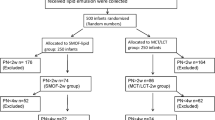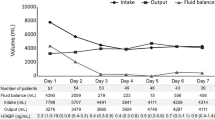Summary
This study examined the postoperative plasma endotoxin level, plasma endotoxin inactivation capacity and clinical outcome after administration of an enteral diet supplemented with glutamine, arginine and ω-3-fatty acid in patients undergoing gastrointestinal operations on an prospective, randomized and double-blind design. 40 patients undergoing gastrointestinal operations were randomized into two groups, with each having 20 patients. One group received standard enteral nutrition and the other was fed the formulation supplemented with glutamine, arginine and ω-3-fatty acid. The two groups were isonitrogenous. The infusion was started from day 1 after surgery and continued for 7 days. Blood samples were collected on the morning of day 1 before operation and on the morning of 1, 4 and 7 day(s) after operation and analyzed for plasma endotoxin level and endotoxin inactivation capacity (EIC). Our study found no differences between the two groups on plasma endotoxin level. After surgery a rapid reduction in plasma endotoxin inactivation capacity was observed in both groups, a significant recovery of the plasma endotoxin inactivation capacity was observed on morning of day 4 after surgery in the study group (0.12±0.02 EU/mL and 0.078±0.022 EU/mL respectively,P<0.01). Shortened hospital stay was observed in the experimental group (11.7±2.0 days in the control group and 10.6±1.2 days in the experimental group respectively,P=0.03). It is concluded that perioperative parenteral nutrition supplemented with glutamine, arginine and ω-3-fatty acid ameliorated postoperative immunodepression but without direct effect on endotoxemia.
Similar content being viewed by others
References
Wilmore D W, Smith R J, O'Dwyer S Tet al. The gut: A central organ after surgical stress. Surgery, 1988, 104: 917
Angele M K, Faist E. Clinical review: immunodepression in the surgical patient and increased susceptibility to infection. Crit Care 2002, 6: 298
Amersfoort E S V, Van Berkel T J C, Kuiper J. Receptors, Mediators, and Mechanisms Involved in Bacterial Sepsis and Septic Shock, Clin Microbiol Rev, 2003; 16: 379
Warren H S, Novitsky T J, Ketchum P Aet al. Neutralization of bacterial lipopolysaccharides by human plasma. J Clin Microbiol, 1985, 22: 590
Berger D, Schleich S, Seidelmann Met al. Correlation between endotoxin-neutralizing capacity of human plasma as tested by the limulus-amebocyte-lysate-test and plasma protein levels. FEBS, 1990, 277: 33
Buttenschoen K, Buttenschoen D C, Berger Det al. Endotoxemia and acute-phase proteins in major abdominal surgery. Am J Surg, 2001, 181: 36
Hiki N, Berger D, Mimura Yet al. Release of endotoxin-binding proteins during major elective surgery: role of soluble CD14 in phagocytic activation. World J Surg, 2000, 24: 499
Kirk H J, Heys S D. Immunonutrition. Br J Surg, 2003, 90: 1459
Melis G C, ter Wengel N, Boelens P Get al. Glutamine: recent developments in research on the clinical significance of glutamine. Curr Opin Clin Nutr Metab Care, 2004, 7: 59
MacFie J, McNaught C. Glutamine and gut barrier function. Nutrition, 2002, 18: 433
Yao G X, Xue X B, Jiang Z Met al. Effects of perioperative parenteral glutamine-dipeptide supplementation on plasma endotoxin level, plasma endotoxin inactivation capacity and clinical outcome. Clin Nutr, 2005, 24: 510
Cohen J, MaConnell J S Observation on the measurement and evaluation of endotoxemia by a quantitative Limulus lysate microassay. J Infect Dis, 1984, 150: 916
Muckart D, Bhagwanjee S. American College of Chest Physicians/Society of Critical Care Medicine Consensus Conference definitions the systemic inflammatory response syndrome and allied disorders in relation to ciritically injured patients. Crit Clin Med, 1997, 25: 1789
Novak F, Heyland D K, Avenell Aet al. Glutamine supplementation in serious illness: a systematic review of the evidence. Crit Care Med, 2002, 30: 2022
Senkal M, Haaker R, Deska T Aet al. Early enteral gut feeding with conditionally indispensable pharmaconutrients is metabolically safe and is well tolerated in postoperative cancer patients—a pilot study. Clin Nutr, 2004, 23: 1193
Author information
Authors and Affiliations
Additional information
Yao Guoxiang, male, born in 1971, M. D. Ph. D.
Rights and permissions
About this article
Cite this article
Guoxiang, Y., Xinbo, X., Xingpei, L. et al. Effects of postoperative enteral immune-enhancing diet on plasma endotoxin level, plasma endotoxin inactivation capacity and clinical outcome. J. Huazhong Univ. Sci. Technol. [Med. Sci.] 25, 431–434 (2005). https://doi.org/10.1007/BF02828215
Received:
Issue Date:
DOI: https://doi.org/10.1007/BF02828215




